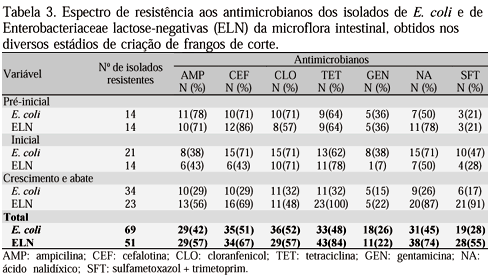In this investigation samples of broiler chicken faeces were collected, during one breeding cycle (45 days). The samples were quantitatively analyzed regarding the presence of Escherichia coli and of Enterobacteriaceae lactose negative (ELN). The positive and negative lactose colony counting were carried out in agar MacConkey plates and the isolates were submitted to in vitro antimicrobial susceptibility tests, by agar disk diffusion method. For E. coli the number of these microrganisms stabilized around 10(6) CFU/g of faeces, and of 10(5) CFU/g for ELN. The resistance and multirresistance results to antimicrobials of E. coli isolates were observed in 98.6% and 65.7%, and 98.1% and 84.6% to ELN, respectively. The E. coli and ELN resistance rates were: 52 and 57% to chloramphenicol, 51 and 67% to cephalothin, 48 and 84% to tetracycline, 45 and 74% to nalidixic acid, 42 and 57% to ampicillin, 28 and 55% to sulphametoxazole + trimethoprim and 26 and 22% to gentamicin, respectively. The study demonstrated that broiler chickens may act as important antibiotic resistant gene reservoirs for veterinary and human medicine.
Chicken; resistant bacteria; antibiotic



